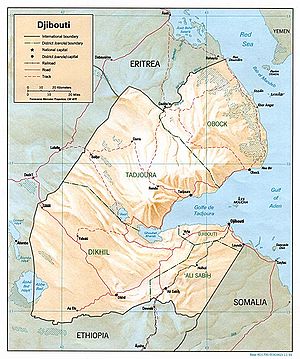- Djiboutian Civil War
-
Djiboutian Civil War 
Map of DjiboutiDate November 1991 - December 1994 Location Djibouti Result Government victory
FRUD Peace AccordBelligerents  Djibouti
Djibouti
 France
France FRUD Movement
FRUD MovementCommanders and leaders  Hassan Gouled Aptidon
Hassan Gouled AptidonN/A Casualties and losses Unknown 100 killed (Djiboutian claim) Eritrean War of Independence – Eritrean Civil Wars – Ethiopian Civil War – Ogaden War – 1982 Border War – Somali Civil War – Djiboutian Civil War – Insurgency in Ogaden – Hanish Islands conflict – Eritrean-Ethiopian War – OEF Horn of Africa – Ethiopian war in SomaliaThe Djiboutian Civil War (also known as the Afar insurgency) was a conflict in Djibouti between the People's Rally for Progress (RPP) government (predominantly Issa in ethnicity) and the predominantly Afar rebel group, the Front for the Restoration of Unity and Democracy (FRUD). This civil war broke out in November 1991 as a reaction to the lack of Afar presence in the government despite representing a sizeable percentage of the country's population. That month, Afar rebels laid siege to the northern towns of Tadjoura and Obock and captured all the military posts in the country’s north.[1]
Fighting occurred mainly in northern areas. In one controversial incident, however, in the capital city of Djibouti on December 18, 1991, government troops moved into the Afar Arhiba District of the capital and opened fire on crowds; at least 59 people were killed.[2][3] In February 1992, some French troops were deployed in the north to aid the government forces.[4] Additionally, France tried to mediate between the government and FRUD, but peace talks in November 1992 failed, as did ones in May 1993.[5]
The government launched an offensive on July 5, 1993, which recaptured much of the rebel-held territory. This renewed fighting, however, caused thousands of Djiboutians to flee to neighboring Ethiopia.[6]
A moderate faction of FRUD signed a peace accord with the government on December 26, 1994, effectively ending the conflict, although a radical faction continued small-scale armed resistance, eventually signing its own peace agreement in 2001. Two FRUD members were made cabinet members, and beginning with the presidential elections of 1999 the FRUD has campaigned in support of the RPP.[7]
See also
References
- ^ "Djibouti army reports 100 rebels killed." The Associated Press, January 19, 1992.
- ^ [1]
- ^ Pour la 12ème commémoration du massacre d’Arhiba
- ^ "250 French Troops Sent to Djibouti War Zone." Associated Press, February 25, 1992.
- ^ "Rebels turn down president's terms for negotiations." Agence France Presse, May 10, 1993
- ^ "Thousands Of Djiboutians Flee to Ethiopia." The Associated Press, July 12, 1993.
- ^ Djibouti (07/08)
External links
 Djibouti topics
Djibouti topicsHistory Politics Constitution · Elections · Flag · Foreign relations · Law enforcement · Military · Political parties · President · Prime MinisterGeography Economy and infrastructure Culture and society Communications · Demographics · Education · Ethnic groups · Health · Holidays · Languages · Media · Music · Olympics · ReligionThis African history–related article is a stub. You can help Wikipedia by expanding it.
